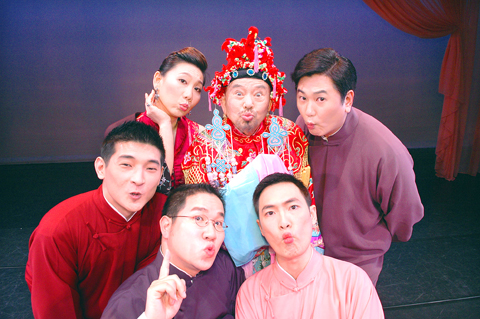The Yellow Crane Tower (黃鶴樓) of Wuhan, in China's Hubei Province, is the stuff of legend. First built during the Three Kingdoms (三國) period, over the centuries poets have waxed philosophical about it, architects have pondered its various styles, and historians have used it as a point of departure to discuss China's many dynasties.
Under the witty pen of Taiwanese comedian Wu Jau-nan (吳兆南), however, the Tower serves as part of a joke that a teacher is trying to convey to two dim-witted pupils. The dialogue is one of six taking place between a teacher and his students in Spring Sun Performing Arts Troupe's (春禾劇團) latest cross-talk performance called Wujiandao (吳間道), beginning tonight at Novel Hall.
Cross talk (相聲) is a style of Chinese comedy that employs complex wordplay in monologues or dialogues to mock a particular person or the preoccupations of society.

PHOTO COURTESY OF SUMMIT BRAIN NEW PRODUCTION AGENCY
With Wujiandao, Spring Sun takes aim at Taiwan's obsession with fame, money and the Chinese classics.
In one dialogue, the teacher uses the popular television series One Million Star (星光大道) as an example to teach students how to become famous. Another discusses how classical Chinese forms are used in modern writing.
Wujiandao will be performed at Novel Hall (新舞臺), 3-1 Songshou S Rd, Taipei City (台北市松壽路3-1號), today and tomorrow at 7:30pm and tomorrow and Sunday at 2:30pm. NT$400 to NT$1,200 tickets are available through NTCH ticketing.

In the March 9 edition of the Taipei Times a piece by Ninon Godefroy ran with the headine “The quiet, gentle rhythm of Taiwan.” It started with the line “Taiwan is a small, humble place. There is no Eiffel Tower, no pyramids — no singular attraction that draws the world’s attention.” I laughed out loud at that. This was out of no disrespect for the author or the piece, which made some interesting analogies and good points about how both Din Tai Fung’s and Taiwan Semiconductor Manufacturing Co’s (TSMC, 台積電) meticulous attention to detail and quality are not quite up to

April 21 to April 27 Hsieh Er’s (謝娥) political fortunes were rising fast after she got out of jail and joined the Chinese Nationalist Party (KMT) in December 1945. Not only did she hold key positions in various committees, she was elected the only woman on the Taipei City Council and headed to Nanjing in 1946 as the sole Taiwanese female representative to the National Constituent Assembly. With the support of first lady Soong May-ling (宋美齡), she started the Taipei Women’s Association and Taiwan Provincial Women’s Association, where she

Chinese Nationalist Party (KMT) Chairman Eric Chu (朱立倫) hatched a bold plan to charge forward and seize the initiative when he held a protest in front of the Taipei City Prosecutors’ Office. Though risky, because illegal, its success would help tackle at least six problems facing both himself and the KMT. What he did not see coming was Taipei Mayor Chiang Wan-an (將萬安) tripping him up out of the gate. In spite of Chu being the most consequential and successful KMT chairman since the early 2010s — arguably saving the party from financial ruin and restoring its electoral viability —

It is one of the more remarkable facts of Taiwan history that it was never occupied or claimed by any of the numerous kingdoms of southern China — Han or otherwise — that lay just across the water from it. None of their brilliant ministers ever discovered that Taiwan was a “core interest” of the state whose annexation was “inevitable.” As Paul Kua notes in an excellent monograph laying out how the Portuguese gave Taiwan the name “Formosa,” the first Europeans to express an interest in occupying Taiwan were the Spanish. Tonio Andrade in his seminal work, How Taiwan Became Chinese,